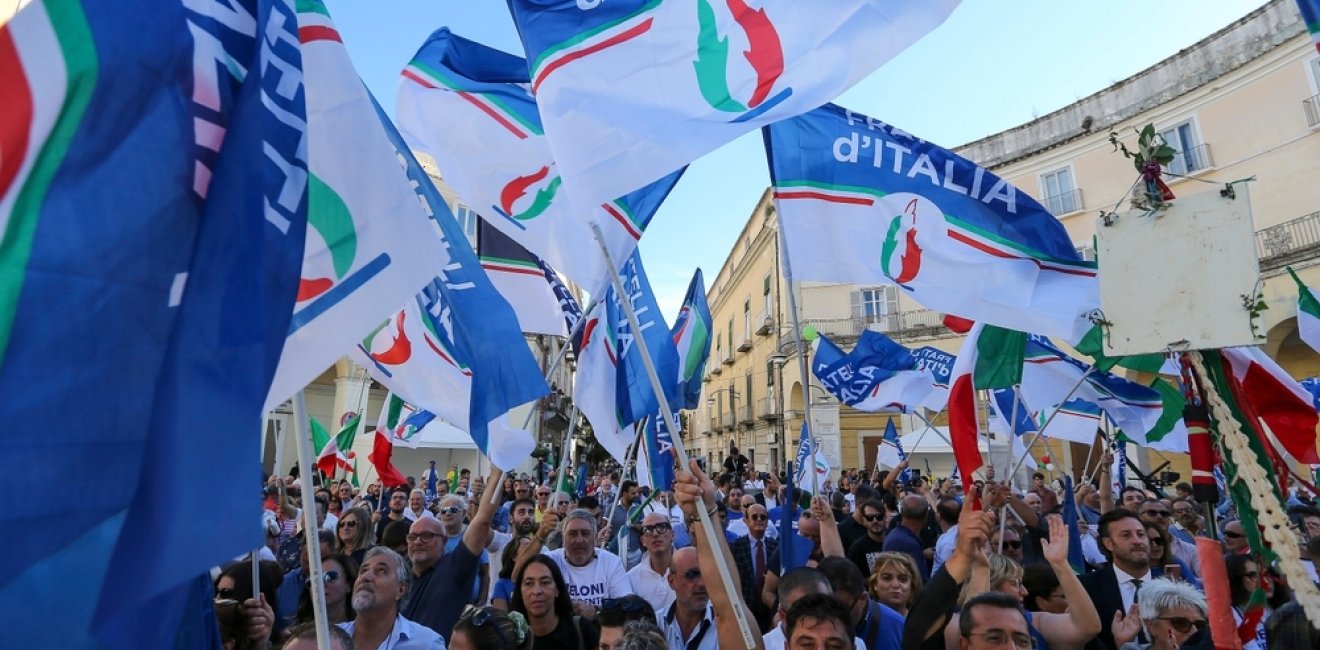This past weekend’s snap elections in Italy marked the end of Mario Draghi’s technocratic administration, ushering in a new era dominated by the far-right. Likely to be led by Giorgia Meloni, the incoming coalition government threatens to fragment the European Union when unity is more urgent than ever. This shift to the right is a harbinger of financial instability in the Eurozone, stalled EU integration and reform, and challenges to the Western response to Russia’s invasion of Ukraine.
Last month, Italy's Prime Minister Mario Draghi resigned following the collapse of his coalition government. Draghi, a former European Central Bank President who saved the euro, took the reins in February 2021, steering the country through the uncertainty of the pandemic and the associated economic downturn. His stewardship bolstered international confidence in Italy, and he had numerous victories during his short eighteen months in office — for instance, he secured more than 190 billion euros from the EU in exchange for reforms and helped the Italian economy rebound from the COVID-19 pandemic. However, his government collapsed after months of strained relations within the coalition, which ultimately culminated in the Five Star Movement (M5S) rejecting a plan to mitigate the rising cost of living, undermining his political agenda. While Draghi’s mandate was previously set to expire in 2023, this shakeup resulted in early elections, leaving Italy to form its 68th government in 77 years.
As expected, the elections resulted in a victory for the right-wing alliance led by Meloni’s Brothers of Italy (FdI), a party with roots in fascism that emerged as the frontrunner on a platform of nativist and Euroskeptic views. Meloni, now positioned to become Italy’s first female Prime Minister, will likely form a coalition government in the coming weeks with Matteo Salvini’s League and Silvio Berlusconi’s Forza Italia. After attempts to soften its image and shake its fascist reputation, the FdI surged from around 4 percent of the vote in 2018 to projections of over 26 percent in 2022. Salvini’s League and Berlusconi’s Forza Italia both received about 8 percent each, giving Meloni’s likely coalition 44 percent of the vote. Meloni will continue the trend of anti-establishment parties—such as the M5S and the League—rising quickly through the Italian political landscape before crashing when it becomes apparent they cannot govern effectively.
The new government takes power amid economic turmoil, with rising prices and slowing growth buffeting countries across Europe, including Italy. A Meloni government will make it more difficult to tackle these challenges. First, the right-wing alliance’s pledge to pursue a loose fiscal policy is unsustainable for a country where government debt exceeds 150% of GDP. Second, the right-wing coalition’s campaign platform suggested it will attempt to renegotiate Italy’s recovery and resilience plan, which outlines reforms that must be satisfied to receive EU funds, citing “changed conditions, needs, and priorities.” Attempting renegotiation could threaten the disbursement of this funding, which Italy sorely needs. Even delays in implementing the existing agreement could spook investors in Italian debt, driving up premiums and further straining public finances.
Such financial volatility would have adverse effects beyond Italy, impacting the entire European Union. Widening of the gap between Italian bond yields and those of other Eurozone countries such as Germany could inhibit transmission of monetary policy and undermine political support for EU institutions. Moreover, higher bond premiums could force the European Central Bank to reduce its purchases of Italian debt, threatening the success of the EU recovery fund and the viability of future joint borrowing, which is vital for the Union’s fiscal integration.
The new government is also likely to clash politically with Brussels. The right-wing alliance’s professed “adhesion” to European integration cannot be taken at face value— under Meloni, Italy could become another illiberal state in the Union alongside Hungary and Poland. In a jab at the FdI’s fascist past, Ursula von der Leyen warned Italy the EU has “tools” at its disposal to push back against a turn towards illiberalism. Last year, the FdI and the League signed a declaration with other European right-wing parties denouncing the EU as “a tool of radical forces” working towards “a European Superstate.” Moreover, the FdI previously proposed legislation that would withdraw Italy from its legal commitments at the European level. If passed, this would pose a direct challenge to the principle of primacy of EU law, developed over nearly sixty years of jurisprudence.
The change in government may also slow momentum toward EU reform. Draghi advocated for faster integration on key issues such as migration and defense and was noted for his close relationship with French President Emmanuel Macron, often viewed as the bloc’s most pro-EU leader—notably, the two issued a joint call for reform of EU fiscal rules last December. Along with Macron and German Chancellor Olaf Scholz, Draghi was also instrumental in the decision to grant EU candidacy status to Ukraine and Moldova. As Scholz recently argued, further enlargement necessitates changes to EU decision-making, including abolishing unanimity in sensitive policy areas. Passing such reforms will be more difficult without an EU-friendly government in the bloc’s third-largest economy.
Finally, the right-wing coalition could undermine Italy’s commitment to the collective Western response to Russia’s war against Ukraine. While Meloni has promised to continue supporting Kyiv, her government’s likely economic mismanagement may reduce Italy’s willingness to provide aid and toughen sanctions on Russia. Given Salvini’s skepticism of sanctions and arms deliveries, the League’s presence in government further complicates the picture. Finally, Berlusconi is a noted admirer of Putin and has struggled to condemn the invasion in recent months. Putin will exploit any perceived divisions in the new Italian government’s approach to Russia in order to drive a wedge in the Western response to the invasion of Ukraine.
Italy’s new political leadership should be cause for significant concern to the European Union and to the liberal order more broadly. The right-wing alliance’s efforts to moderate its image in the run-up to the election cannot erase its history of skepticism toward the European Union and sympathy towards autocrats. Italy’s new leadership portends grave consequences both domestically and for all of Europe at a time when unity and resilience are critical.
Authors



Global Europe Program
The Global Europe Program is focused on Europe’s capabilities, and how it engages on critical global issues. We investigate European approaches to critical global issues. We examine Europe’s relations with Russia and Eurasia, China and the Indo-Pacific, the Middle East and Africa. Our initiatives include “Ukraine in Europe”—an examination of what it will take to make Ukraine’s European future a reality. But we also examine the role of NATO, the European Union and the OSCE, Europe’s energy security, transatlantic trade disputes, and challenges to democracy. The Global Europe Program’s staff, scholars-in-residence, and Global Fellows participate in seminars, policy study groups, and international conferences to provide analytical recommendations to policy makers and the media. Read more

Explore More
Browse Insights & Analysis
Greenland’s New Governing Coalition Signals Consensus

The Future of France's Far-Right Party

Ukrainian Issue in Polish Elections

